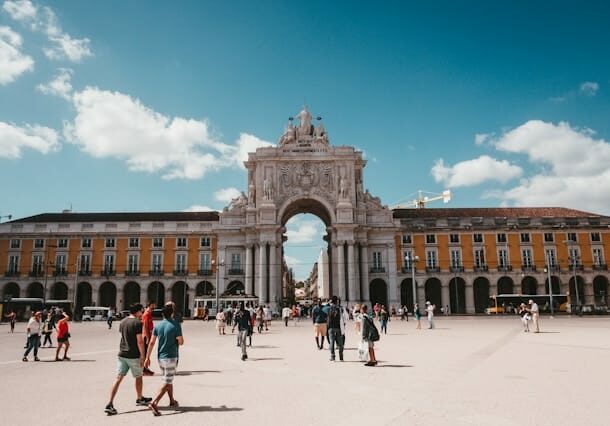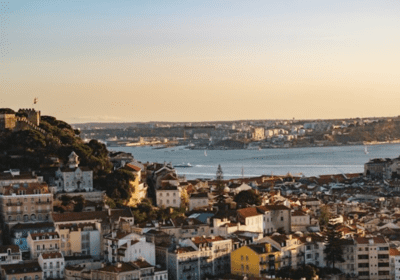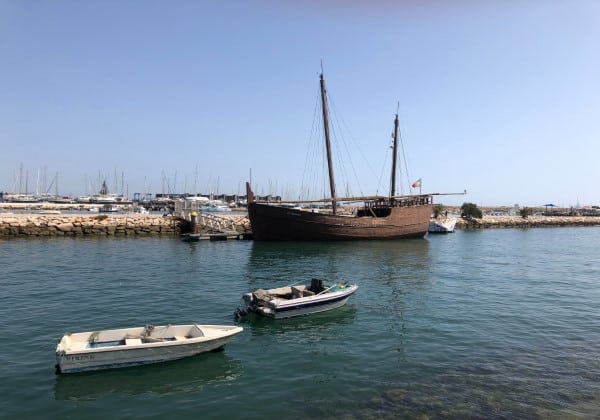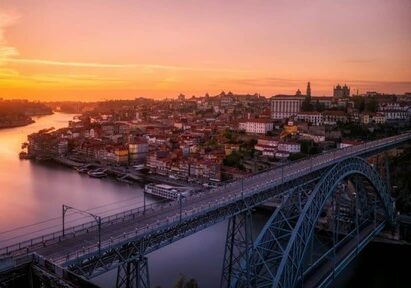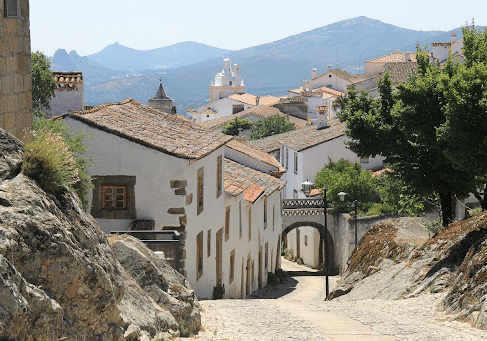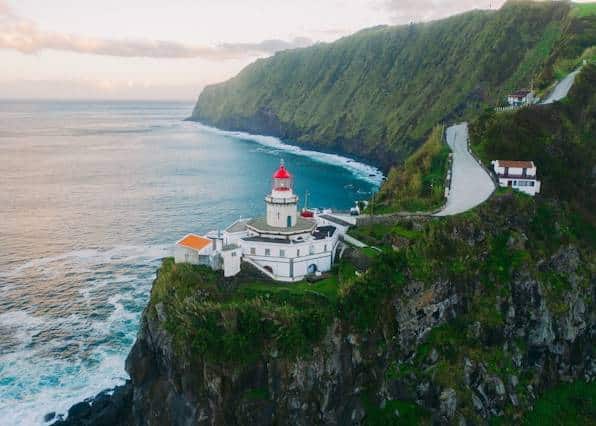Updated: June 22, 2025
Portugal’s perfect weather, beautiful waters on the Atlantic coast, diverse culture, and high quality of life at a reasonably affordable cost compared to other European countries attracts visitors from across the globe, including Europe and the USA.
Beyond the country’s undeniable charm, the Portugal tourism sector also plays a pivotal role in its economy. The tourism sector generates significant revenue, creates jobs for Portuguese residents, and boosts infrastructure development.
This comprehensive guide to Portugal tourism shares everything you need to know about traveling to the country, from where to stay, the best things to do in each region of Portugal, and travel tips to ensure an unforgettable experience.
Statistics on Tourism in Portugal
Portugal tourism is thriving. In 2024, Portugal had 31.6 million international visitors and recorded 80.3 million overnight stays, reflecting annual increases of 5.2 and 4 percent, respectively.
This growth in tourism has benefitted the Portuguese economy significantly. The 2024 Economic Impact Research report, published by the World Travel and Tourism Council, revealed that Portugal’s travel and tourism sector is responsible for 20 percent of the national economy, proving the tourism sector is a key economic driver.
According to the World Travel and Tourism Council, the tourism sector is also set to support 1.14 million jobs, an increase of 126,000 jobs compared to the pre-pandemic period.
Looking to the remainder of 2025, all regions are poised for further growth. Not only is tourism in Portugal expected to grow by 9 percent this year, according to the Secretary of State for Tourism, but the Portuguese National Statistics Institute’s (INE) latest tourism sector data shows an increase of 12.6 percent in total revenue (a total monthly revenue of €571.1 million) in April 2025 compared to April 2024.
With its diverse offerings, idyllic scenery, thriving tech sector, and investor confidence exceeding its pre-pandemic level, the country is well-positioned to continue captivating many tourists and generating significant economic benefits for the national economy, brightening the outlook for Portugal tourism for the rest of this year and beyond.
Portugal Tourism: Popular Destinations to Visit
Portugal invites you to explore the vibrant capital of Lisbon or take a day trip down south to bask in the sunshine and the sublime climate the Algarve coast offers. A journey north to Porto will reveal Portuguese culture’s rich history and vibrancy. At the same time, the rolling plains of the Alentejo region allow you to travel through the quieter areas of this beautiful country with a mild Mediterranean climate.
In the section below, discover Portugal’s gems and the stunning Azores and Madeira Islands. We will detail all the best places to visit in Portugal and what each tourism hotspot offers.
Lisbon Region
Lisbon, Portugal’s captivating capital, offers both traditional charm and modern energy. The city center and larger Metropolitan area have much to offer, and some of the best tourist attractions in Lisbon draw many tourists from all over the world to its urban areas.
The Alfama district at the heart of Lisbon features narrow streets that wind past pastel-colored houses. At the same time, traditional Fado music spills from hidden bars and restaurants that serve world-class gastronomy.
The trendy Bairro Alto district is Lisbon’s contemporary pulse, where you can shop for unique treasures in bustling streets and markets; plus, the area is a haven for Lisbon’s young crowd seeking a dynamic Portugal nightlife scene.
Baixa is the elegant downtown of Lisbon, where neoclassical buildings line cobblestone streets, and the iconic Santa Justa Lift whisks you up to breathtaking city views.
Algarve
Portugal’s crown jewel, the Algarve, is renowned for its endless stretches of golden sand and turquoise waters. It is also well known that the Algarve is a celebrity hotspot for luxury vacations and upmarket property purchases.
The southern region of Portugal is a haven where beach lovers can unwind on pristine shores in Lagos, a charming town steeped in history or explore hidden coves and dramatic cliffs.
Beyond the beach, you will discover a world of outdoor adventures, including hiking scenic trails, kayaking along secluded Atlantic coastlines, or teeing off on one of the region’s world-class golf courses, like the Monte Rei Golf and Country Club.
Faro is the Algarve’s gateway city to Portugal’s captivating history, where a charming historic center awaits. In Albufeira, you won’t just find a resort town catering to all desires, from family fun to delectable seafood feasts; it is also home to a vibrant nightlife scene.
Porto and Northern Portugal
There are many things to do in Porto and Northern Portugal. You can immerse yourself in the country’s renowned wine region, cruise on the majestic Douro River, and discover charming towns, each offering authentic Portuguese charm.
For those visiting or living in Porto, the city offers a glimpse into Portugal’s soul, where the Ribeira district’s cobbled streets and historic São Francisco Church can be found.
Across the river from Porto, the city of Vila Nova de Gaia is a popular tourist destination offering green spaces, museums and art galleries, port wine houses, and a magnificent view from the south bank of the Douro River and the city of Porto.
Further north into the Douro Valley, you’ll find terraced vineyards and scenic hillsides in towns and villages, including Vila Real, Amarante, and Baião, perfect for exploring Portugal’s countrysides.
Alentejo
The Alentejo region features a unique blend of history and nature, making it Portugal’s rising sustainable tourism star, offering travelers a scenic escape from the crowds drawn to more popular tourist attractions in Lisbon and the Algarve region.
The region’s capital, Évora, is a UNESCO World Heritage treasure trove filled with Roman temples and medieval architecture, just a one-and-a-half-hour drive from Lisbon. The Alentejo real estate options along the coast offer a relaxing haven, with beautiful beaches and hidden coves ideal for sunbathers and surfers.
In Reguengos de Monsaraz, you will discover rolling green hills that cradle renowned wineries. At the same time, Comporta offers a luxurious vacation vibe and is often referred to as the “Hamptons of Europe.”
In Melides, close to Comporta, you can enjoy the perfect mix of comfort and untouched beauty. A perfect escape from the city lights, Melides offers many spas and wellness centers and attractions adding to the eco-tourism industry including sustainable wine farms. Overall, the Alentejo offers a simpler view of life on the Portuguese coast and the greater Portugal.
Central Portugal
Central Portugal isn’t just about stunning landscapes and quaint towns (though it has those too – think of Nazaré’s world-famous waves or the charming town of Óbidos famed for its chocolate cups that contain potent ginjinha liqueur). This central region is the heart of Portuguese culture.
In Coimbra, you’ll be enveloped by the weight of history at the prestigious University of Coimbra, one of the oldest universities in Europe, and later, the melancholic melodies of Fado will fill the air, rounding off the traditional Portuguese atmosphere.
Nature lovers won’t be disappointed in Central Portugal either. Serra da Estrela, Continental Portugal’s highest mountain range, draws outdoor adventurers with some of the best hiking trails in Portugal, cascading waterfalls, and even winter skiing getaways.
The Azores and Madeira Islands
Portugal boasts two stunning archipelagos in the Atlantic Ocean, the Azores and Madeira Islands, perfect for adventure seekers and nature lovers. The Azores is a haven of volcanic landscapes offering dramatic scenery, everything from emerald lakes nestled in craters to sky-high viewpoints (miradouros) showcasing the islands’ contrasting blues and greens.
You can hike Pico Island, home to Portugal’s highest mountain, and savor its unique character and renowned wine. You can explore São Miguel, the most developed island with its vibrant capital, Ponta Delgada, or find tranquility on Corvo, the smallest and northernmost island of the Azores archipelago.
Madeira beckons with its eternal spring climate, breathtaking ocean vistas, and rich culture showcased in museums, festivals, and art exhibitions. You will also be able to enjoy a memorable vacation with hiking, diving, or golf, or just relaxing, soaking up the sun on the coast and the cultural richness Madeira offers. The Berlengas Islands off the coast of Peniche in Portugal are another lesser-known archipelago to explore.
Portugal Tourism Attractions: The Best Things to Do in Portugal
Now that we have explored the tourist map of Portugal, you’ll need to know what the best tourist attractions and activities are to do.
Below, we uncover Portugal’s most popular tourist attractions and the experiences that await in one of the world’s sunniest and most welcoming countries. Here are some of the best things to do in Portugal!
Stunning Portuguese beaches
Considering Portugal’s natural beauty and sublime climate, it is no surprise that the world’s best beach, according to Tripadvisor’s prestigious Best of the Best Beaches list for 2024, is the stunning Praia da Falésia in Albufeira, Algarve. Look at a few of the best and most beautiful beaches to check out on your holiday in Portugal.
- Praia da Falésia in Albufeira
- Meia Praia in Lagos
- Praia da Nazaré in Nazaré
- Praia da Marinha in Faro
- Praia Da Rocha in Portimão
Tourism Portugal: Sightseeing, leisure and recreational activities
Portugal offers exciting things to do and see for every type of traveler. History buffs can explore Portugal’s rich past by exploring medieval castles, Roman ruins, and iconic landmarks like the Jerónimos Monastery and Belém Tower, remnants of the Age of Discovery. The Monastery of Santa Maria de Cós, located in the surroundings of Alcobaça, is another historical gem to see.
Foodies should also make sure to taste the famous original pastéis de nata at Pastéis de Belém, first made in 1837 and following the same ancient recipe.
Bustling European cities like Lisbon and Porto offer delectable cuisine, the melancholic melodies of Fado music, and a warm atmosphere. Nature lovers will be enchanted by the diverse landscapes of Peneda-Gerês National Park or the volcanic Azores archipelago, a haven for adventure activities.
Leisure options abound, from challenging yourself on the world-class Algarve golf courses to catching legendary waves on Portugal’s West Coast. Beyond the usual attractions, Portugal offers unique experiences like staying at the Vermelho resort, a 13-room haven designed by Christian Louboutin, or exploring the enchanting Pena National Palace and the mysterious caves of Quinta da Regaleira in Sintra.
With cultural intrigue, vibrant energy, and stunning getaways like Sintra, nestled amidst lush mountains, Portugal caters to every traveler’s desires.
Important Portugal Tourist Information for Visitors
Now that you have explored the ultimate Portugal tourism guide, it’s time to plan your trip. Before booking your flight to Portugal, you must consider visa requirements, traveling costs, and health and safety considerations. We look at these considerations in the section below.
Portuguese visa requirements
To legally enter Portugal, you must apply for a Schengen Visitor Visa or a Schengen Tourist Visa. Although different, both visas allow you to enter and stay in the Schengen Area for a maximum of 90 days within a 180-day period. This is the case for most non-EU countries, but it is best to check your specific location’s requirements in line with Portuguese government guidelines.
European Union citizens, UK citizens, US citizens, and nationals of certain other countries can enter Portugal visa-free for a three-month stay. Application and entry requirements may change, so when you apply at your local Portuguese Embassy, request the latest information specific to the country that you are coming from and the passport you hold.
For the Tourist or Visitor Visa, application requirements include the following:
- A completed and signed visa application form
- A valid passport
- Two recent passport-size photographs
- Proof of accommodation for the duration of your visit
- Proof of sufficient financial means for the duration of your stay
- Proof of travel medical insurance
- Proof of ties to your home country, such as a letter from an employer or a school, if a student
- Any additional documents required by the Portuguese Consulate or the nearest Portuguese Embassy from where you are applying
Arrange your money matters
Once you’ve booked your flight and received your visa, it’s essential to plan your budget for the stay and ensure you have sufficient funds to support yourself and enjoy your Portugal experience.
The official currency is the Euro (€), and most places accept debit and credit cards. Still, it’s a good idea to carry some cash for rural areas or markets, as some spots only take Portuguese cards.
Explore basic information on exchange rates with your local currency, and you can also plan your budget according to our guide in the cost of living in Portugal.
Research safety and health
Portugal boasts a reputation as one of Europe’s safest destinations, with a low crime rate. By following basic safety measures, you’re unlikely to encounter any issues. This peace of mind extends to the stunning island paradises of Madeira and the Azores, which are both incredibly safe destinations.
However, it’s important to remember that while Portugal’s public healthcare system is excellent, it doesn’t cover visitors. Obtaining travel insurance before your trip is crucial to ensure you’re covered for any unexpected medical emergencies.
The best times to visit Portugal
Portugal’s charm unfolds throughout the year thanks to its generally mild weather. However, the ideal time to visit hinges on your interests. Beach lovers flock to the shores during the high season (June to August), while shoulder seasons (April to June and September to November) offer comfortable weather for outdoor adventures and come with the perk of smaller crowds and potentially lower prices.
Budget travelers may find the low season (November to March) most attractive, though some regions may experience more rain. So, consider your priorities – sunshine and swimming, exploring nature and world heritage sites, or seeking a budget-friendly adventure – to pick the perfect time for you to discover Portugal.
Navigating public transport in Portugal
When visiting a new country, planning and ensuring you can get around quickly is essential, which is quite simple to do in the digital age. Transportation in Portugal is reliable, from efficient train and bus networks to easy access to car rentals, Uber and Bolt. This is especially prevalent in the major cities of Lisbon, Porto, Coimbra, and Braga.
Then, once all these logistics are finalized, all that’s left to do is book your flight, pack your bags, and enjoy all that the country has to offer!
If the beauty of Portugal convinces you to stay a bit longer, check out our guide to how to move to portugal, as you’ll need to consider a few more logistics, like obtaining a residency visa and enlisting the help of real estate professionals like Goldcrest to find a place to buy or rent. Our team will be happy to advise you further if you fill out our contact form below.
Frequently Asked Questions about Tourism in Portugal
What is the best month to visit Portugal?
The ideal time to visit depends on your interests. Beach lovers visit during the high Portuguese tourism season, from June to August.
The shoulder seasons, which include the months of April, June, September, and November, offer mild temperatures, smaller crowds, and lower prices. Budget-conscious travelers would find great deals during the low visitor season between November and March.
Is Portugal expensive for vacation?
If you seek a luxury vacation, then costs can run high. However, Portugal is one of the most affordable countries in Western Europe, and on average, consumer prices in Portugal are almost 33.4 percent lower than in the USA.
Typically, a three-course meal for two people at a good restaurant would cost around €45; a taxi would charge €1 per kilometer; an internet package would cost about €37 per month for an unlimited plan; and a seat at the cinema costs €7.70.
Is Portugal a good place for tourists?
Absolutely! Portugal welcomes visitors with its friendly, helpful, and polite people. English is widely spoken, making it easy to communicate with locals. It’s safe, affordable, easy to get around, and packed with things to see and do.
What is the nicest part of Portugal to visit?
That really depends on what you’re looking for, but a few places stand out. Lisbon is perfect for city lovers, with its charming streets, culture, and food. The Algarve is ideal for beachgoers, with its stunning coastline and sunny weather.
If you’re interested in the wine tourism Portugal offers or its beautiful natural scenery, head to the Douro Valley. And if you’re after a quieter, more traditional vibe, try Alentejo or one of the many historic towns like Évora or Óbidos.
Are people in Portugal friendly to Americans?
Yes, the Portuguese people are generally warm, welcoming, and happy to help visitors, including Americans. Many locals speak at least some English, and Americans (and all other tourists) are treated with kindness. If you make a little effort with basic greetings or polite phrases in Portuguese, the locals appreciate that, too.

